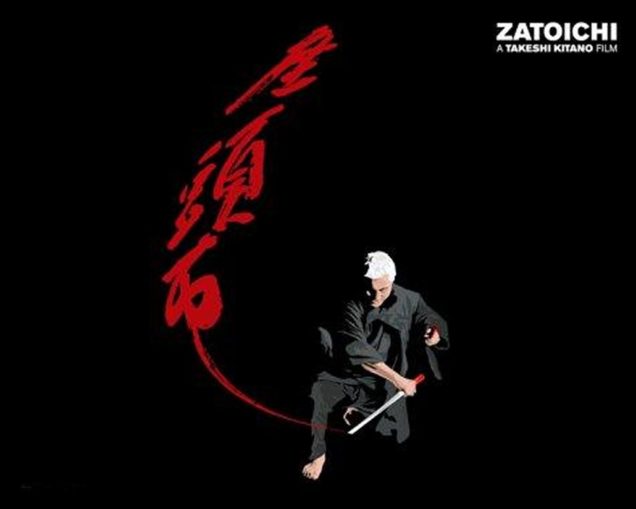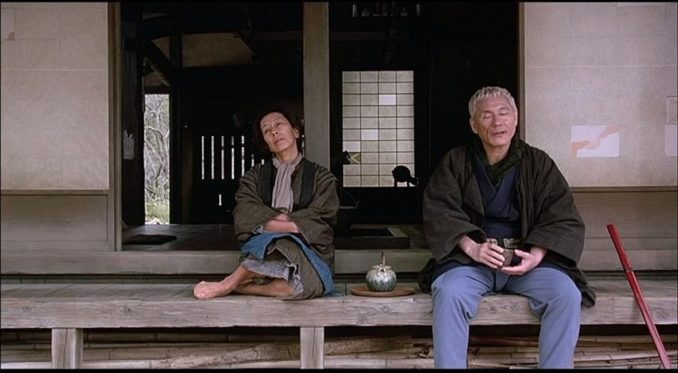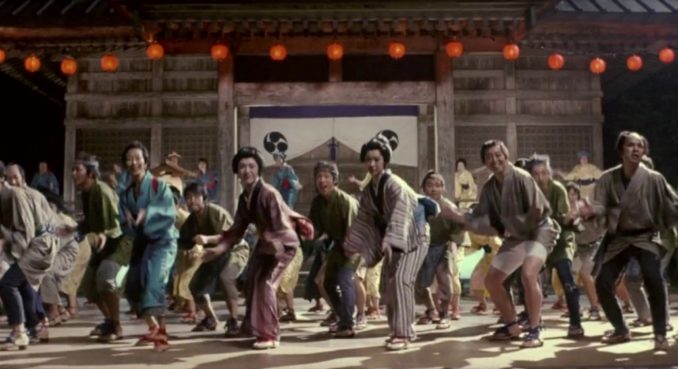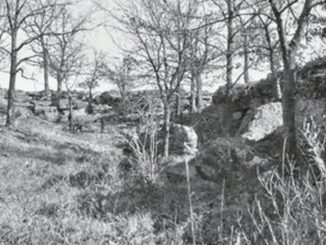
Hands up who wants to watch a tap dancing, comedy, Samurai flick? No? Well, you should do. Zatoichi is such a breath of fresh air in the action genre that I came away with a great smile on my face. A film full of so many unexpected moments, that in another directors’ hands it could have been a disaster. It leans heavily on the traditional storytelling of Japanese cinema, echoing the great films of Kurosawa and then subsequently Leone. The film centres on our wandering hero, Zatoichi, who stumbles into the midst of a local dispute, between rival Yakuza gangs vying for control in a backwater village, while the local community struggle on under the weight of their oppression. So far, so normal, yet the film then veers off from this trajectory in weird and wonderful ways that never fail to surprise. This probably isn’t a shock to Japanese viewers or those who know the work of the director in the UK, but for the uninitiated the film was made by Takeshi Kitano, star of works as varied as Takeshi’s Castle, Merry Christmas, Mr Lawrence and Battle Royale. Here he wrote, directed and starred in the lead role, and managed to combine farce, tragedy, noir, action and musical all into a wonderous kaleidoscope of a film.

The action opens with our hero, Zatoichi, a blind masseur, resting by the side of the road before being assailed by a gang of thugs, we then swiftly move to the local village where we are introduced to the main characters; a local spinster who takes pity and offers him board, a pair of geisha girls, an unemployed ronin and his sick wife, the inn keeper, the casino owner, local bums, unruly youth, and the gang members who extort the local population. Little by little we learn of the background to these characters, through conversations and flashbacks, and so the stage is set for all these loose ends to come together as the film unfolds. It is a mark of the strength of storytelling that the main character is quite often not on screen, but instead the director makes time for the idle conversation and gossip of minor characters, grounding the story in the reality of everyday life in the Shogunate of medieval Japanese society. Our blind hero, is almost a casual observer at times, merely minding his own business whether drinking Sake down the local, or gambling on the dice at the betting shop. He shambles around the village, his face an almost expressionless void as he tilts his head trying to listen into the goings on around him, chuckling to himself at private jokes. Fate, however, has other plans, and trouble seems to find him regardless.
And trouble a plenty there is, what with this being a samurai film. Unlike many a modern film though the action here is balletic. None of the extended fight scenes of Hong Kong or Hollywood blockbusters, but instead a more realistic portrayal of how fights actually are. These sequences aren’t full of supermen that can withstand multiple blows but are settled by who is the quickest to strike the first, and often the last blow. This adds a real intensity as when the fights come, they are short, swift and brutal. The action shown is not graphic but more akin to a lightsabre fight in Star Wars, the pain shown in the facial expression of the victim rather than gaudy blood and guts. And what blood there is, is portrayed in artistic fashion.

Yet, for all the action and intrigue, the film is a comic gem from the first scene to the last. Whether it be incompetent swordsmen, idiotic children and sarcastic drunks, the laughs keep coming, with the comic heart of the film personified by the gambling nephew of the spinster, played by Taka Guadalcanal with gormless aplomb. And as we drift from traditional drama, through tragedy and action, the plot is segued by interludes of dancing farmers, musical carpenters and culminating in a finale more akin to West Side Story. The soundtrack being a strange mix of classical and modern Japanese music is sparse but great. Rather than a film in the mould of Yojimbo or A Fistful of Dollars, it should be seen as more akin to Lethal Weapon.
The story of Zatoichi is famous in Japan, spawning over 20 films, a long running tv show and countless books, yet Kitano has been able to take the material and breathe new life into it, giving an irreverent take and making it his own. The cast are great, the twists in the story well hid, the direction playful, and at just under two hours, only a blind man would cease to be entertained. Enjoy.

© Authur 2023



